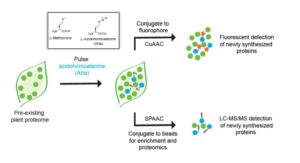Time-resolved analysis of protein synthesis in native plant tissue
 Glenn et al. introduce a new method for the labeling and purification of newly-synthesized proteins from intact tissues. The method, named BONCAT (Bioorthogonal Non-Canonical Amino Acid Tagging) involves the incorporation of the non-canonical methionine surrogate azidohomoalanine (Aha) into newly synthesized proteins. Aha has a reactive azide side chain that can be conjugated for instance to a fluorescent dye for visualization, or to a bead for purification. The authors demonstrate the application of this method through an analysis of proteins induced by heat stress and recovery. Finally, the authors observe that this new method can be carried out with commercially-available reagents and without the need for specialized equipment beyond that found in a standard proteomics lab. Plant Physiol. 10.1104/pp.16.01762
Glenn et al. introduce a new method for the labeling and purification of newly-synthesized proteins from intact tissues. The method, named BONCAT (Bioorthogonal Non-Canonical Amino Acid Tagging) involves the incorporation of the non-canonical methionine surrogate azidohomoalanine (Aha) into newly synthesized proteins. Aha has a reactive azide side chain that can be conjugated for instance to a fluorescent dye for visualization, or to a bead for purification. The authors demonstrate the application of this method through an analysis of proteins induced by heat stress and recovery. Finally, the authors observe that this new method can be carried out with commercially-available reagents and without the need for specialized equipment beyond that found in a standard proteomics lab. Plant Physiol. 10.1104/pp.16.01762




Leave a Reply
Want to join the discussion?Feel free to contribute!